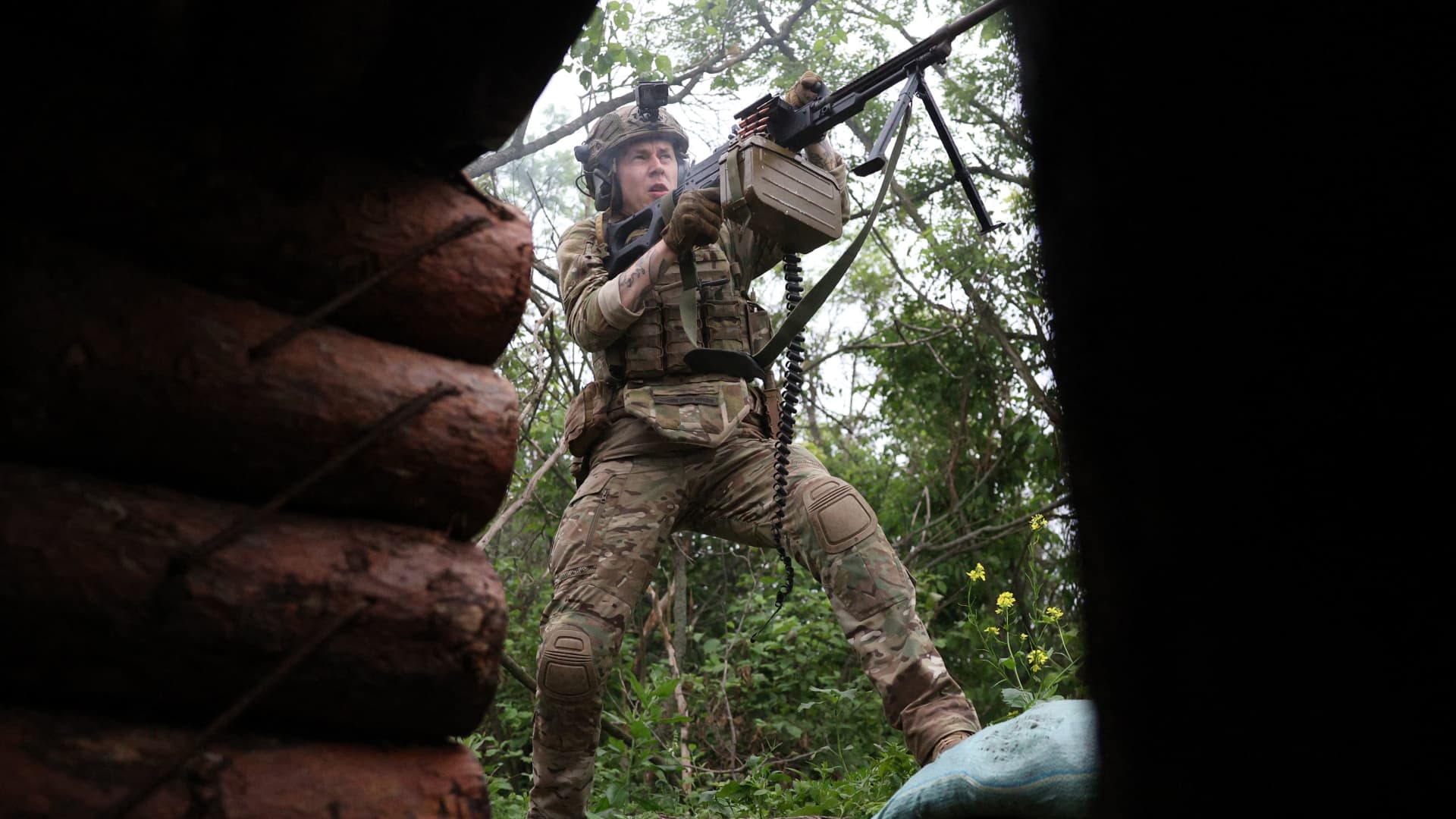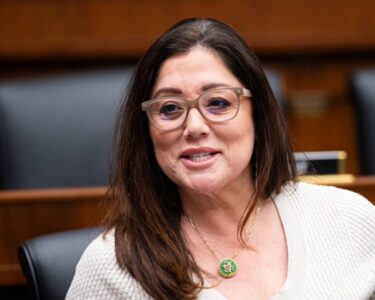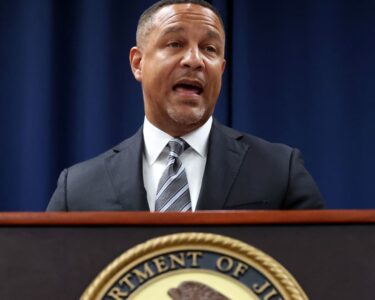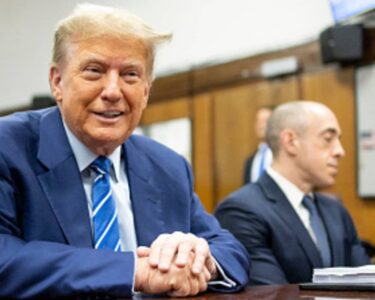This was CNBC’s live blog tracking developments on the war in Ukraine on June 19. 2023. See here for the latest updates.
Ukraine’s President Volodymyr Zelenskyy said the country’s armed forces are making gains in their counteroffensive, saying in his nightly address Sunday that “our troops are advancing, position by position, step by step, we are moving forward.”
Zelenskyy’s comments come as Ukraine’s counteroffensive enters its third week. Unlike several previous counteroffensives that saw Ukraine recapture an impressive amount of territory relatively quickly, this counteroffensive has been different, with Ukraine recapturing only a handful of settlements and progress expected to be limited by deep Russian defenses.
Ukraine met with its international allies last week to discuss Kyiv’s military progress and ongoing needs, but Zelenskyy said Sunday that “the main thing is the speed of supply” of weaponry after a series of delays in decision-making over weapons, and their supply to Ukraine.
In other news, Russia’s security service said on Monday it had thwarted a series of Ukrainian “sabotage and terrorist plots” targeting Russian-backed officials in Russian-occupied territory in Ukraine. Kyiv has not responded to the claims.
French President Emmanuel Macron announced Monday that Europe’s first medium-range anti-missile system, jointly developed by France and Italy, has been delivered and is operational in Ukraine, according to a report from French newspaper Le Monde.
The SAMP/T system, known as Mamba, is the only European-made technology that can handle ballistic missiles, Reuters reported in February. It is intended to help Ukraine defend itself against Russian drones, missiles and planes. Le Monde compared it to the Patriot, an American missile defense system.
Macron delivered the news at a meeting of defense ministers in Paris.
The announcement comes four months after France and Italy said the technology was ready. In February, the two countries said they would deliver the missile system to Ukraine this spring, according to Reuters.
“It really is Europe protecting Europe,” Macron said at the meeting, according to The Associated Press.
— Rebecca Picciotto
Denmark has pledged to more than double its budget for Ukrainian military support, the Danish Ministry of Defence announced on Monday.
The country first established funding of about $1 billion for Ukraine in March, according to Reuters, which would provide resources for Ukraine’s military, as well as civilian and business aid, while the country fights back in the war against Russia.
That fund will increase to more than $3 billion over the next five years, Reuters reported. The country has promised to provide $2.6 billion more for Ukraine’s military, most of which will be available in 2023 and 2024, Denmark’s Ministry of Foreign Affairs said in a Monday statement.
“Denmark shows solidarity with Ukraine through multifaceted and long-term support provided bilaterally and in concert with our partners and allies,” the Foreign Affairs Ministry said, in a statement.
— Rebecca Picciotto
Secretary of State Antony Blinken told NBC News on Monday that his visit to Beijing was an “important start” to repairing U.S.-China relations, especially after the strain brought by an alleged Chinese spy balloon reported in February.
He had postponed the trip after the U.S. military discovered the spy balloon over the U.S. So long as no more spy balloons are found in the skies above the U.S., Blinken wants to leave the incident in the past so that the two economic superpowers can strengthen ties.
“That chapter should be closed,” Blinken said in an NBC interview before leaving Beijing. During his trip, he spent two days in meetings with senior Chinese officials, including President Xi Jinping.
The two countries have yet to reestablish military communication channels, though Blinken says it is necessary and is “not something we’re going to drop.”
China cut those lines of military communication last year after former House Speaker Nancy Pelosi visited Taiwan, which is self-governing though Beijing claims it as its own territory. President Joe Biden said that a deal to reopen the communication had stalled due to the spy balloon.
Though military communication between the U.S. and China is currently on pause, Blinken said that he was assured in the meeting with Jinping that China had no intentions of providing aid to Russia in the war against Ukraine.
Blinken said he brought up the surveillance issue multiple times in his meetings with Chinese officials and is something that the U.S. government “will continue to watch.”
Read more on the story here: Xi tells Blinken in high-stakes meeting: World needs stable U.S.-China relations
— Rebecca Picciotto
The Kremlin said Monday it is too unsafe to send the United Nations’ humanitarian aid workers into areas impacted by the recent Kakhova Dam collapse where civilians are stranded.
Dmitry Peskov, press secretary for the Kremlin, said in a call with reporters that the war has made humanitarian visits too risky, though he did not say outright that Russia had obstructed the U.N.’s aid, according to The Associated Press.
The Kremlin’s comments come a day after the U.N. condemned Russia for interfering with its humanitarian efforts.
On Sunday, U.N. Humanitarian Coordinator Denise Brown said in a statement that Russia has denied the U.N.’s request to send aid to the Kakhova Dam area, which is located in southern Ukraine and is currently under Russian military control.
“We urge the Russian authorities to act in accordance with their obligations under international humanitarian law,” Brown said in the statement.
Survivors of the dam flood have faced a shortage of food, water and electricity, all while attacks continue in the area. Some rescuers from Ukraine have endured the risk of Russian snipers to evacuate stranded Ukrainians.
—Rebecca Picciotto
After a high-profile meeting with the Chinese president on Monday, U.S. Secretary of State Antony Blinken said he had received assurances that Beijing was not providing lethal aid to Russia, nor had any intentions to do so in future.
There have been long-standing concerns that Beijing could provide weapons to its ally Moscow that could be used in the war against Ukraine. China has repeatedly insisted it has no plans to do so.
“With regard to lethal aid to to Russia for use in Ukraine, we and other countries have received assurances from China, that it is not and will not provide legal assistance to Russia for use in Ukraine,” Blinken told a press conference Monday after meeting Chinese President Xi in Beijing.
Blinken said the U.S. had not “seen any evidence that contradicts that.”
“What we do have ongoing concerns about though are Chinese firms, companies, that may be providing technology that Russia can use to advance its aggression in Ukraine. And we have asked the Chinese government to be very vigilant about that,” Blinken said.
Blinken and Xi Jinping’s meeting comes at a low point in Sino-U.S. relations, with tensions rife over trade, tech and geopolitics, including Beijing’s close relationship with Moscow.
At this latest high-stakes meeting, China’s president stressed the importance of steady relations between China and the U.S.
Read more on the story here: Xi tells Blinken in high-stakes meeting: World needs stable U.S.-China relations
— Holly Ellyatt
Ukraine will not be invited to join NATO when the alliance meets for a high-profile summit in Lithuania next month, the defense alliance’s Secretary-General Jens Stoltenberg said Monday.
“At the Vilnius summit and in the preparations for the summit, we are not discussing to issue a formal invitation,” he told reporters after meeting German Chancellor Olaf Scholz in Berlin, Reuters reported.
Stoltenberg also warned against accepting a “frozen” conflict in Ukraine, saying: “We all want this war to end, but a just peace cannot mean freezing the conflict and accepting a deal dictated by Russia.”
Meanwhile, Scholz told the press conference that Germany is prepared for the possibility that the war in Ukraine could still last for a while and that Berlin is “preparing for that and adjusting our policies based on that.”
Ukraine has repeatedly expressed a desire to join NATO and while the alliance has fully backed Kyiv’s attempts to repel Russia’s invasion, including with billions of dollars’ worth of military aid, NATO membership for Ukraine is seen as a very distant prospect given Russia’s staunch opposition to such a move, and a reluctance among a few NATO members to antagonize Moscow further.
— Holly Ellyatt
British Prime Minister Rishi Sunak spoke to Ukrainian President Volodymyr Zelenskyy Monday as London prepares to host the Ukraine Recovery Conference this week.
During the call, Sunak “paid tribute to the bravery of the Ukrainian soldiers on the front line of the counteroffensive and said it was clear they were making good progress,” a statement from Downing Street noted.
“Looking ahead to the NATO summit next month, the Prime Minister told President Zelenskyy that he believed NATO members would demonstrate a strong signal of support for Ukraine at the Vilnius meeting,” the statement added.
The conference, which begins Wednesday, is “a unique opportunity to underline the strong public and private sector support for Ukraine, and demonstrate the country’s transformation and ongoing reform,” the leaders agreed, Downing Street said.
The Ukraine Recovery Conference will focus on mobilizing international support for Ukraine’s economic and social stabilization and recovery from the effects of war, organizers say, “including through emergency assistance for immediate needs and financing private sector participation in the reconstruction process.”
— Holly Ellyatt
While there are Russian troops in Ukraine, there will be no negotiations with Russia, a top
Ukrainian official reiterated Monday.
Andriy Yermak, the head of the President’s Office, said on Telegram that “there will be no negotiations with Russia while their troops are in Ukraine. President Volodymyr Zelensky’s peace formula provides for the withdrawal of Russian troops from the entire territory of Ukraine,” the head of the presidential administration said.
Both Zelenskyy and his Russian counterpart Vladimir Putin have met with African leaders in the last few days, with the possibility of peace talks high on the agenda.
On Friday, Zelenskyy said at a press conference with leaders of a number of African countries that Russia is considering negotiations as a way to freeze the conflict and accumulate forces and expand its aggression, news agency Ukrinform reported.
Diplomatic negotiations, he said, are therefore impossible as long as Russians are on Ukrainian territory.
— Holly Ellyatt
Jailed opposition leader Alexei Navalny appeared before a Russian court on Monday to face new charges of extremism that could extend his prison term by decades.
The hearing took place at the IK-6 penal colony in Melekhovo, about 235 km (145 miles) east of Moscow, where Navalny is already serving sentences totalling 11-1/2 years.
His supporters accuse Russian authorities of trying to break him in prison to silence his criticism of President Vladimir Putin, something the Kremlin denies.
An entry in the court record last month showed the new charges relate to six different articles of the Russian criminal code, including inciting and financing extremist activity and creating an extremist organisation.
Russia has outlawed Navalny’s campaign organisation as part of a crackdown on dissent that started well before the conflict in Ukraine and has intensified in the nearly 16 months since it started. Last week one of his regional campaign leaders was jailed for 7-1/2 years.
In a tweet posted on his account by his supporters last month, Navalny responded with typical irony to the new charges.
“Well, Alexei, you’re in some real trouble now … The Prosecutor General’s Office has officially provided me with 3,828 pages describing all the crimes I’ve committed while already imprisoned.”
He said he had not been allowed to read the material to find out what exactly he was accused of because he was once again in solitary confinement and allowed only a mug and one book.
Navalny, 46, earned admiration from the disparate opposition for voluntarily returning to Russia in 2021 from Germany, where he had been treated for what Western laboratory tests showed was an attempt to poison him with a Soviet-era nerve agent.
The Kremlin denied trying to kill him and said there was no evidence he had been poisoned with such a toxin.
It was not immediately clear which specific actions or incidents the new charges referred to. One relates to “rehabilitation of Nazism” – a possible reference to Navalny’s declarations of support for Ukraine, whose government Russia accuses of embodying Nazi ideology. Ukraine and its Western allies dismiss that charge as baseless.
— Reuters
Ukraine has liberated eight settlements in southern Ukraine over the past two weeks as its counteroffensive continues, the country’s Deputy Defense Minister Hanna Maliar said Monday.
Maliar noted on Telegram that Ukrainian troops “were both on the offensive and on the defensive” last week.
“In the east, the enemy made a lot of efforts to stop the advance of our troops in the direction of Bakhmut. Transferred additional units there and increased the number of shelling,” she said, saying that while the overall intensity of fighting in this direction decreased, 41 clashes took place. Ukrainian troops “advanced deep into the enemy in several areas,” she said.
“Over the past week in the east, the enemy has fired more than 5,800 rounds and used 277,022 rounds of ammunition,” she added.
In southern Ukraine, meanwhile, there was an offensive in several directions in the past week, she said.
“Units of missile troops and artillery of the Defence Forces of the Tavria direction performed 10,125 fire missions during the week,” she said, with eight “settlements liberated by units of the “Tavria” OSUV [Tavria operational-strategic group]: Novodarivka, Levadne, Storozheve, Makarivka, Blagodatne, Lobkovo, Neskuchne, Pyatikhatky” the latter being the latest village to have been purportedly recaptured.
In general, the units in the Tavria direction (in southern Ukraine) advanced to the depth of the enemy up to 7 km (4.3 miles), she said, with the liberated area in the south amounting to 113 square km.
“Over the past week, the enemy suffered significant losses. In particular, last week the losses of the enemy in all directions amounted to more than 4,600 killed and wounded, in addition, our defenders captured more than 80 fighters of the aggressor,” Maliar said. CNBC was unable to immediately verify the information in the post.
— Holly Ellyatt
Russia’s FSB security service said on Monday it had thwarted a series of Ukrainian “sabotage and terrorist plots” targeting Russian-backed officials on Russian-controlled territory in Ukraine and had arrested one woman as part of its investigation.
The FSB said in a statement that the attacks had targeted Russian law enforcement officials and Russian-installed government officials in the southern Zaporizhzhia region, one of four areas in Ukraine that Moscow says it has annexed since the start of what it calls its “special military operation.”
Kyiv is currently mounting a counteroffensive to retake what it and the West say was illegally seized territory. There was no immediate comment from Ukraine on the Russian allegations.
The FSB said it had opened criminal cases against an unnamed woman it described as “an accomplice” on charges related to terrorism and the illegal possession of explosives.
— Reuters
Russia has highly likely started, over the last 10 days, to relocate elements of its Dnipro Group of Forces (DGF) from the eastern bank of the Dnipro River to reinforce the Zaporizhzhia and Bakhmut areas, Britain’s Ministry of Defense said Monday.
“This potentially involves several thousand troops from the 49th Army, including its 34th Separate Motorised Brigade, as well as Airborne Forces (VDV) and Naval Infantry units,” the ministry said in its latest intelligence update on Twitter.
“The DGF redeployment likely reflects Russia’s perception that a major Ukrainian attack across the Dnipro is now less likely following the collapse of Kakhovka Dam and the resulting flooding,” the U.K. said.
Ukraine accused Russia of blowing up the Kakhovka hydroelectric power plant dam in early June, saying it did so to thwart Ukraine’s counteroffensive in the southern Kherson region. Russia denied any involvement in the incident, although preliminary evidence suggests it was involved in undermining the dam.
Floodwaters in the Kherson region are subsiding but thousands of people aren’t able to return to their homes yet, and those that are remain without power.
— Holly Ellyatt
Ukraine’s President Volodymyr Zelenskyy said the country’s armed forces are making gains in their counteroffensive.
“Our troops are advancing, position by position, step by step, we are moving forward,” he said in his nightly address Sunday.
Zelenskyy’s comments come as Ukraine’s counteroffensive continues into its third week. Unlike several previous counteroffensives that saw Ukraine recapture an impressive amount of territory relatively quickly, this counteroffensive has been different, with Ukraine recapturing just a handful of settlements and progress expected to be limited by deep Russian defenses.
Ukraine met with its international allies last week to discuss Kyiv’s military progress and ongoing needs but Zelenskyy said Sunday that “the main thing is the speed of supply” of weaponry after a series of delays in decision-making over weapons, and their supply to Ukraine.
“Next week, we will have new important communications with our partners, for the sake of our movement, for the sake of weapons, for the sake of our warriors having everything they need,” he said Sunday.
— Holly Ellyatt
Putin says nuclear weapons transferred to Belarus; Ukraine ‘will be equal to NATO allies’






